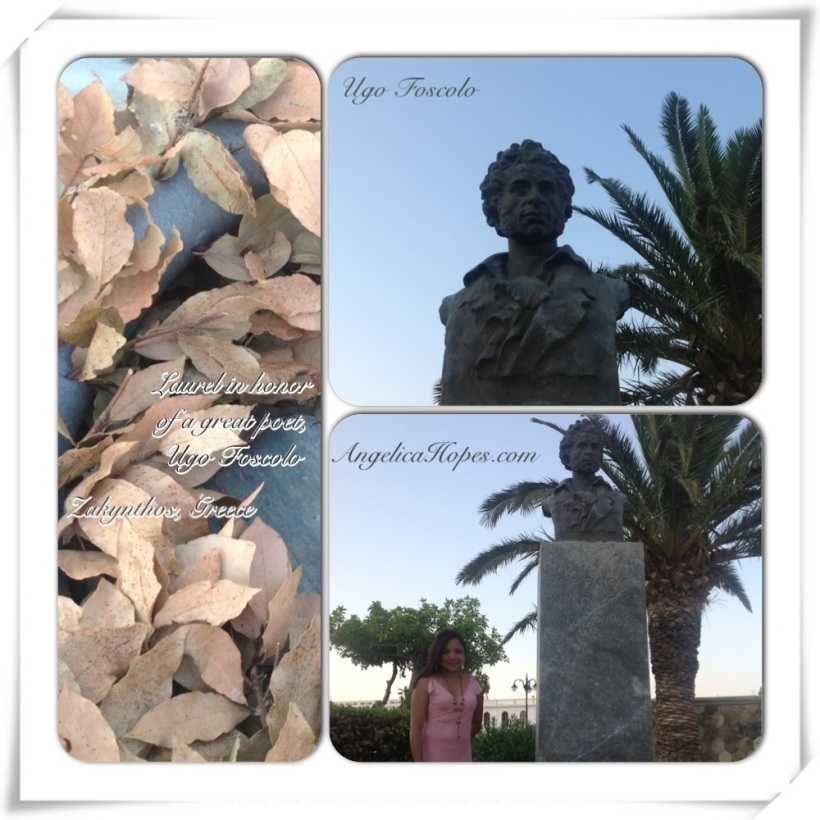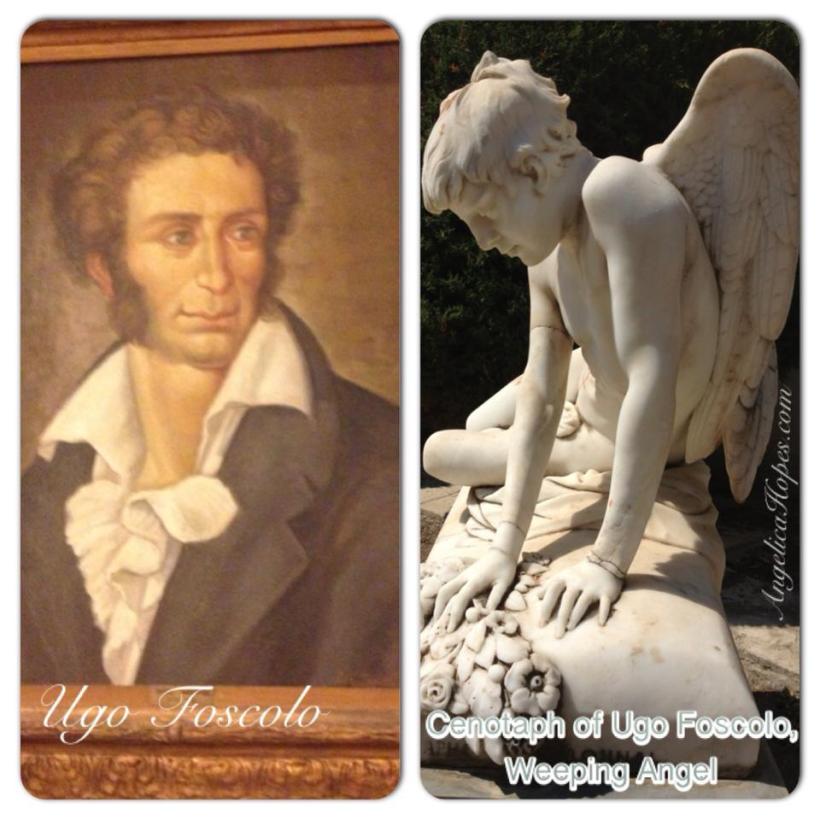While roaming around the city capital center and harbor of Zakynthos, I searched for the bust in honor of Ugo Foscolo.
Two days prior our departure to Zakynthos, my husband, Camiel sent me SMS of a great poet who was born in Zante – how the Italians call Zakynthos. I googled Ugo Foscolo and poets on Zakynthos as I found 3 more great Greek literary writers/poets/journalist from the island: Dionysios Solomos (the Greek National Poet), Gregorios Xenopholous (writer-journalist) and Andreas Kalvos (poet).
Edgar Allan Poe also visited Zante and wrote this sonnet:
“Fair isle, that from the fairest of all flowers,
Thy gentlest of all gentle names dost take!
How many memories of what radiant hours
At sight of thee and thine at once awake!
How many scenes of what departed bliss!
How many thoughts of what entombed hopes!How many visions of a maiden that is
No more- no more upon thy verdant slopes!
No more! alas, that magical sad soundTransforming all!
Thy charms shall please no more–Thy memory no more!
Accursed groundHenceforth I hold thy flower-enameled shore,
O hyacinthine isle! O purple Zante!”Isola d’oro! Fior di Levante!”
All’amata, Ugo Foscolo
Meritamente, però’ch’io potei
Abbandonarti, or grido alle frementi
Onde che batton l’alpi, e i pianti miei
Sperdono sordi del Tirreno i venti.
Sperai, poiché mi han tratto uomini e Dei
In lungo esilio fra spergiure genti
Dal’bel paese ove or meni sì rei,
Me sospirando, I tuoi giorni fiorenti,
Sperai che il tempo, e i duri casi, e queste
Rupi ch’io varco anelando, e le eterne
Ov’io qual fiera. dormo atre foreste,
Sarien ristoro al mio cor sanguinente;
Ahi, vóta speme! Amor fra l’ombre inferne
Seguirammi immortale, onnipotente.
U.Foscolo – All’amata
Who is Ugo Foscolo?
(1778–1827)
Italian writer, was born at Zakynthos in the Ionian Isles in 1778. On the death of his father, a physician at Split (now in Croatia) , the family removed to Venice, and in the University of Padua Foscolo completed the studies begun in the Dalmatian grammar school.
Amongst his Paduan teachers was the abbé Cesarotti, whose version of Ossian had made that work highly popular in Italy, and who influenced Foscolo’s literary tastes; he knew both modern and Ancient Greek. His literary ambition revealed itself by the appearance in 1797 of his tragedy Tieste–a production which obtained a certain degree of success. Foscolo, who, from causes not clearly explained, had changed his Christian name Niccolo to that of Ugo, now began to take an active part in the stormy political discussions which the fall of the republic of Venice had provoked. He was a prominent member of the national committees, and addressed an ode to Napoleon Bonaparte, expecting Napoleon to overthrow the Venetian oligarchy and create a free republic.
The Treaty of Campoformio (October 17, 1797), by which Napoleon handed Venice over to the Austrians, gave a rude shock to Foscolo, but did not quite destroy his hopes. The state of mind produced by that shock is reflected in his novel The Last Letters of Jacopo Ortis (1798), which was described by the 1911 Encyclopedia Britannica as a more politicized version of Goethe’s The Sorrows of Young Werther, “for the hero of Foscolo embodies the mental sufferings and suicide of an undeceived Italian patriot just as the hero of Goethe places before us the too delicate sensitiveness embittering and at last cutting short the life of a private German scholar.” The story of Foscolo, like that of Goethe, had a groundwork of melancholy fact. Jacopo Ortis had been a real personage; he was a young student of Padua, and committed suicide there under circumstances akin to those described by Foscolo.
After the fall of Venice Foscolo moved to Milan, where he formed a friendship with the poet Giuseppe Parini, whom he later remembered with pride and gratitude. Still hoping that his country would be freed by Napoleon, he served as a volunteer in the French army, took part in the battle of the Trebbia and the siege of Genoa, was wounded and made prisoner. When released he returned to Milan, and there gave the last touches to his Ortis, published a translation of and commentary upon Callimachus, commenced a version of the Iliad, and began his translation of Lawrence Sterne’s Sentimental Journey. He also took part in a failed memorandum intended to present a new model of unified Italian government to Napoleon.
In 1807, Foscolo wrote his Carme sui sepolcri, which may be described as a sublime effort to seek refuge in the past from the misery of the present and the darkness of the future. The mighty dead are summoned from their tombs, as ages before they had been in the masterpieces of Greek oratory, to fight again the battles of their country. The inaugural lecture on the origin and duty of literature, delivered by Foscolo in January 1809 when appointed to the chair of Italian eloquence at Pavia, was conceived in the same spirit. In this lecture Foscolo urged his young countrymen to study literature, not in obedience to academic traditions, but in their relation to individual and national life and growth.
The sensation produced by this lecture had no slight share in provoking the decree of Napoleon by which the chair of national eloquence was abolished in all the Italian universities. Soon afterwards Foscolo’s tragedy of Ajax was presented, with little success, at Milan, and because of its supposed allusions to Napoleon, he was forced to move from Milan to Tuscany. The chief fruits of his stay in Florence are the tragedy of Ricciarda, the “Ode to the Graces,” left unfinished, and the completion of his version of the Sentimental Journey (1813). His version of Sterne is an important feature in his personal history. When serving with the French he had been at the Boulogne camp, and had traversed much of the ground gone over by Yorick in Sterne’s novel; and in his memoir of Didimo Cherico, to whom the version is ascribed, he throws much light on his own character. He returned to Milan in 1813, until the entry of the Austrians; from there he passed into Switzerland, where he wrote a fierce satire in Latin on his political and literary opponents; and finally he sought the shores of England at the close of 1816.
During the eleven years passed by Foscolo in London, until his death there, he enjoyed all the social distinction which the most brilliant circles of the English capital confer on foreigners of political and literary renown, and experienced all the misery which follows on a disregard of the first conditions of domestic economy. His contributions to the Edinburgh Review and Quarterly Review, his dissertations in Italian on the text of Dante and Boccaccio, and still more his English essays on Petrarch, of which the value was enhanced by Lady Dacre’s admirable translations of some of Petrarch’s finest sonnets, heightened his previous fame as a man of letters. However, he was frequently accused of financial sloppiness, and ended up spending time in debtor’s prison, which affected his social standing after his release.
His general bearing in society had not been such as to gain and retain lasting friendships. He died at Turnham Green on the September 10 1827. Forty-four years after his death, in 1871, his remains were brought to Florence, and with all the pride, pomp and circumstance of a great national mourning, found their final resting-place beside the monuments of Machiavelli and Alfieri, of Michelangelo and Galileo, in the church of Santa Croce.
Reference Source: The Italian Almanac

